Picture it—Miami, 1992. A divorcee is set up on a blind date with her roommate’s dashing and not-much-older uncle. Annoyed at being put in an awkward position, they concoct a scheme for their revenge, pretending to fall in love and horrifying their unwitting matchmaker. As the ruse progresses, however, the two find that their feelings are more than vengeance, and he carries her off to live in his mansion, but not before she shares one of the most tearful goodbyes in television history.
That divorcee was Dorothy Zbornak. And that man was Leslie Nielsen.
Fans of The Golden Girls, the groundbreaking sitcom about four senior women living and dating in South Florida, will recognize not that as not only the plot of the series finale but as a riff on the famous stories told by the show’s matriarch, Sophia, played hilariously by Estelle Getty. In the pilot, Sophia moves in with her put-upon daughter Dorothy (Bea Arthur) and her two roommates, the hapless Rose Nylund (Betty White) and the libertine Blanche (Rue McClanahan). That final episode, which aired 30 years ago this week on NBC, sees Dorothy marrying Blanche’s uncle, Lucas—yes, played by Leslie Nielsen—and running off into the sunset. It marked the end to one of the most storied and celebrated shows in television history.
The critical acclaim and popularity The Golden Girls experienced in its first run foretold a legacy that has endured throughout the three decades since it wrapped production. The show continues to be a ubiquitous presence in pop culture, running in syndication on channels like Hallmark and finding new audiences on streaming platforms like Hulu. It has inspired everything from T-shirts— I own two Golden Girls T-shirts myself—to Funko figures to drag shows.
It is impossible to overstate the lasting success of The Golden Girls, which enjoys a level of popularity and staying power few shows have ever reached. I would argue that is no accident nor coincidence, though. The Golden Girls is, in many ways, the perfect television program—in turns warm and dry, empathetic and sarcastic.
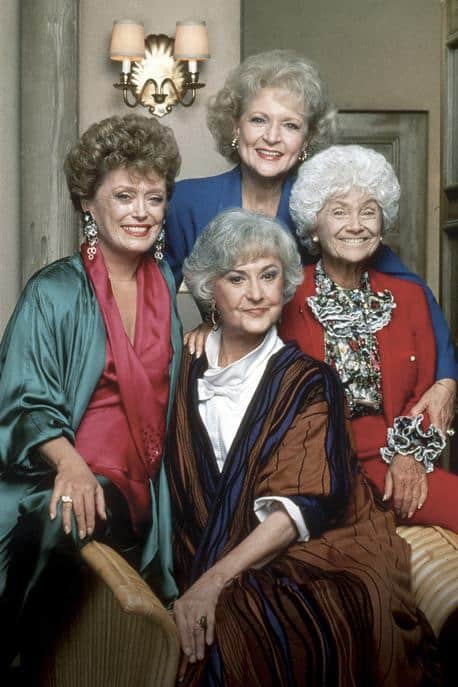 Long before the era of Peak TV, there were four golden girls blazing a trail that other shows would follow. Its influence can be felt in subsequent acclaimed series like Designing Women, Sex and the City, Living Single, and Girls. It launched the careers of folks like Marc Cherry, who went on to create Desperate Housewives and of Winifred Hervey, who served as an executive producer on Fresh Prince of Bel-Air. Tom Whedon, father of Joss (yes, that Joss), was also a writer and producer on the show.
Long before the era of Peak TV, there were four golden girls blazing a trail that other shows would follow. Its influence can be felt in subsequent acclaimed series like Designing Women, Sex and the City, Living Single, and Girls. It launched the careers of folks like Marc Cherry, who went on to create Desperate Housewives and of Winifred Hervey, who served as an executive producer on Fresh Prince of Bel-Air. Tom Whedon, father of Joss (yes, that Joss), was also a writer and producer on the show.
Its most lasting legacy, though, might be the way it put social issues at the forefront of its stories. Transgressive for its time, the show broke barriers by showcasing four women, let alone older women, in leading roles and focusing on not just their roles within the family but on their work lives, their love lives, and—in what was an especially bold move for 1985, the year the series premiered—their sex lives. Never shying away from controversy—one show sees the women confronting homelessness, another features an undocumented teenager (played by a young Mario Lopez), and still another focuses on assisted suicide—the show broke new ground for what TV could do and could be.
In one of its most acclaimed episodes, Season 2’s “Isn’t It Romantic?” Dorothy’s old friend Jean comes for a visit. What the other girls don’t know is that Jean is a lesbian. Throughout the course of the episode she begins developing feelings for naïve and oblivious Rose. Airing in 1986—the year I was born and the height of the AIDS epidemic, a time when homosexuality was incredibly taboo in mainstream society—the show treats Jean not as a punchline but as a sympathetic and fully human individual.
Her wife has just died, and as she bonds with fellow widow Rose over the depth and pain of their losses, the other girls quietly accept Jean’s sexual orientation with little fuss or fanfare. Blanche famously and hilariously confuses lesbian for “Lebanese” before deciding the real scandal is that Jean likes Rose instead of her.
It is Sophia, however, who really captures the ethos of the show in two very memorable lines. “Jean is a nice person,” the octogenarian says matter-of-factly. “She happens to like girls instead of guys. Some people like cats instead of dogs. Frankly, I’d rather live with a lesbian than a cat. Unless the lesbian sheds. Then, I don’t know.” Later in the episode, Sophia says to her daughter that “if one of my kids was gay, I wouldn’t love him one bit less. I would wish him all the happiness in the world.”
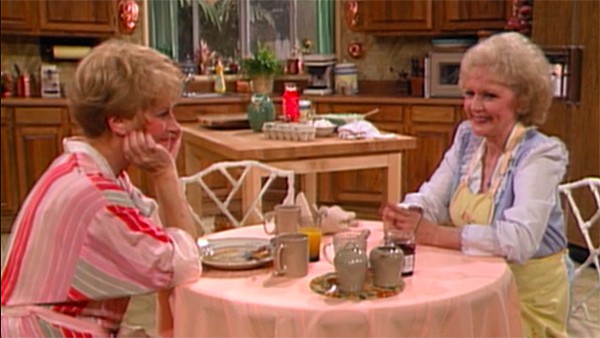 Many critics have pointed to this episode as emblematic of the show’s attitude. Simply put, Golden Girls is about unconditional love and acceptance. Writing for the A.V. Club, Molly Eichel pointed out that “neither Jean nor her sexuality are at any points the butt of the episode; instead she’s treated with respect.”
Many critics have pointed to this episode as emblematic of the show’s attitude. Simply put, Golden Girls is about unconditional love and acceptance. Writing for the A.V. Club, Molly Eichel pointed out that “neither Jean nor her sexuality are at any points the butt of the episode; instead she’s treated with respect.”
This is true not just of Jean, but of most differences the girls encounter. Blanche dates a man in a wheelchair and, in another episode, a blind man—both of whom are seen as desirable. Rose dates a little person. Even Dorothy’s louse of an ex-husband, Stan (Herb Edelman), becomes a beloved recurring character who the girls grudgingly care for. No one is irredeemable (except for Freida Claxton, a reference fans of the show will get). No one is unworthy of love and acceptance. Differences might present confusion and even misunderstandings, but they are resolved and accepted in a very live-and-let-live fashion.
This is especially true of the girls themselves, each of whom could not be more different than the next but who nonetheless manage to form a family of choice that continues to inspire and comfort misfits everywhere. Vivacious Blanche could not be more different than cerebral Dorothy could not be more different than chaste Rose could not be more different than cantankerous Sophia. Somehow, though, the women’s differences compliment one another, challenging and strengthening her sisters-in-cheesecake to see the world—and themselves—in a different light.
The girls often argue—some of the funniest lines come when they’re insulting one another—and they’ll even go days without talking to one another. Yet, you always know that these four women will make amends by the end of the half-hour, not just because the conventions of episodic TV demand it but because these characters show an endless capacity for accepting people warts and all. They could not be more different, but they find in one another a camaraderie and family that so many of us crave in our own lives.
It’s a realization the girls themselves come to in the season two episode “’Twas the Nightmare Before Christmas.” After their flights home were cancelled due to inclement weather, the girls treat to a diner where they begin to laugh and bicker as usual. The diner owner is surprised when he learns they are not blood relations. “The way you were teasing and talking to each other I thought you were family for sure. Isn’t that something?”
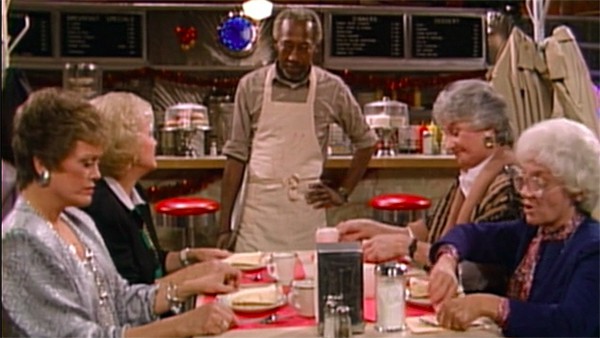 It is something, as the girls quickly realize. “Isn’t it funny how sometimes it takes a total stranger to point out something that’s been right there in front of your face,” Blanche comments. Rose agrees, pointing out that they “were feeling so sorry for ourselves we forgot we are celebrating Christmas with family!” As it begins to snow—in Miami!—Rose goes to put on a Christmas song but, true to character, ends up pushing the wrong button and playing The Beach Boys’ “Surfing Safari.” It remains one of my favorite scenes from any Christmas episode of any show, ever.
It is something, as the girls quickly realize. “Isn’t it funny how sometimes it takes a total stranger to point out something that’s been right there in front of your face,” Blanche comments. Rose agrees, pointing out that they “were feeling so sorry for ourselves we forgot we are celebrating Christmas with family!” As it begins to snow—in Miami!—Rose goes to put on a Christmas song but, true to character, ends up pushing the wrong button and playing The Beach Boys’ “Surfing Safari.” It remains one of my favorite scenes from any Christmas episode of any show, ever.
That’s because to me, that scene sums up what makes The Golden Girls so special. This is, at its heart, a show about friends who become family. For many LGBTQ people, building our own family of choice is something we know well and good. When I lived in Chicago, hundreds of miles from my nearest blood relations, it was those friends who I relied on to help me out, whether I needed a ride home from the eye doctor or a cup of soup when I was sick or even a few extra dollars when I was financially strapped. In the absence of family, friends fill the void.
That is, of course, a philosophy that other shows would follow. Many people point to Friends as the genesis of the now pervasive “friends hanging out” sitcom. I would argue, however, that the true point of origin for this show lies in The Golden Girls, a show whose entire premise is finding camaraderie and familial love from strangers who become friends who become sisters.
The relationship between these four women—the friendship, the loyalty, the strength of their bond—is what keeps us tuning in because it is something we all crave. We all want friends who accept us as we are, whom we can be so unabashedly ourselves in front of that we come of stupid like Rose or slutty like Blanche or nerdy like Dorothy with total comfort and certainty that not only will we not be judged (or, not judged too much) but that they will still love us in spite of it. The certainty that someone will not abandon you, no matter what, is something that often only comes with family.
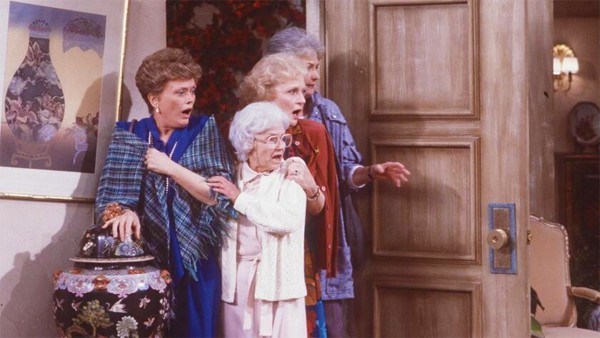 Acceptance and love—not to mention the humor—is what makes The Golden Girls endure. Truly great art always endures—there’s a reason we still read Shakespeare—but iconic art speaks to a fundamental truth about the human condition, which is why some Shakespeare plays are more popular than others. If the pantheon of great TV shows is Shakespeare’s complete catalogue, then The Golden Girls is A Midsummer Night’s Dream, a play on which two Season 7 episodes are loosely based.
Acceptance and love—not to mention the humor—is what makes The Golden Girls endure. Truly great art always endures—there’s a reason we still read Shakespeare—but iconic art speaks to a fundamental truth about the human condition, which is why some Shakespeare plays are more popular than others. If the pantheon of great TV shows is Shakespeare’s complete catalogue, then The Golden Girls is A Midsummer Night’s Dream, a play on which two Season 7 episodes are loosely based.
How fitting, because I truly think The Golden Girls has the enduring and Shakespearean qualities of speaking to the human condition in a way that is both universal and timeless. That is why the show has remained such a hit for so long, and why thirty years after it went off the air, it is still just as beloved as ever. In another 30 years, I suspect a new generation will discover this show and like me and so many others, find in it both a reassuring comfort and a dynamic worthy of emulation—one where all you need to be accepted and loved is to be yourself and enjoy a good cheesecake. That’s truly golden.


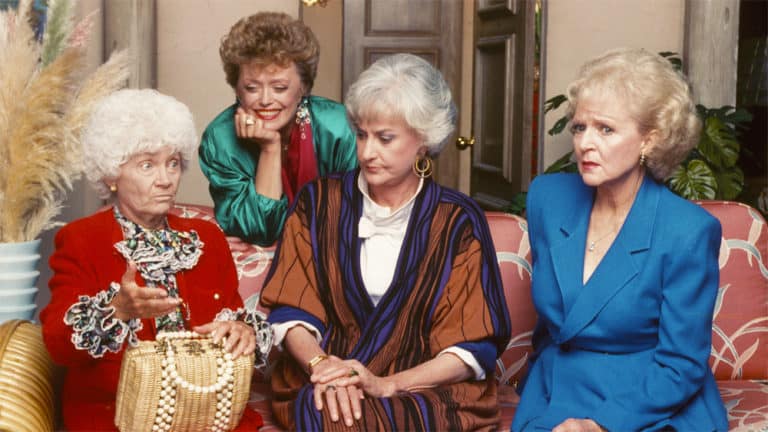
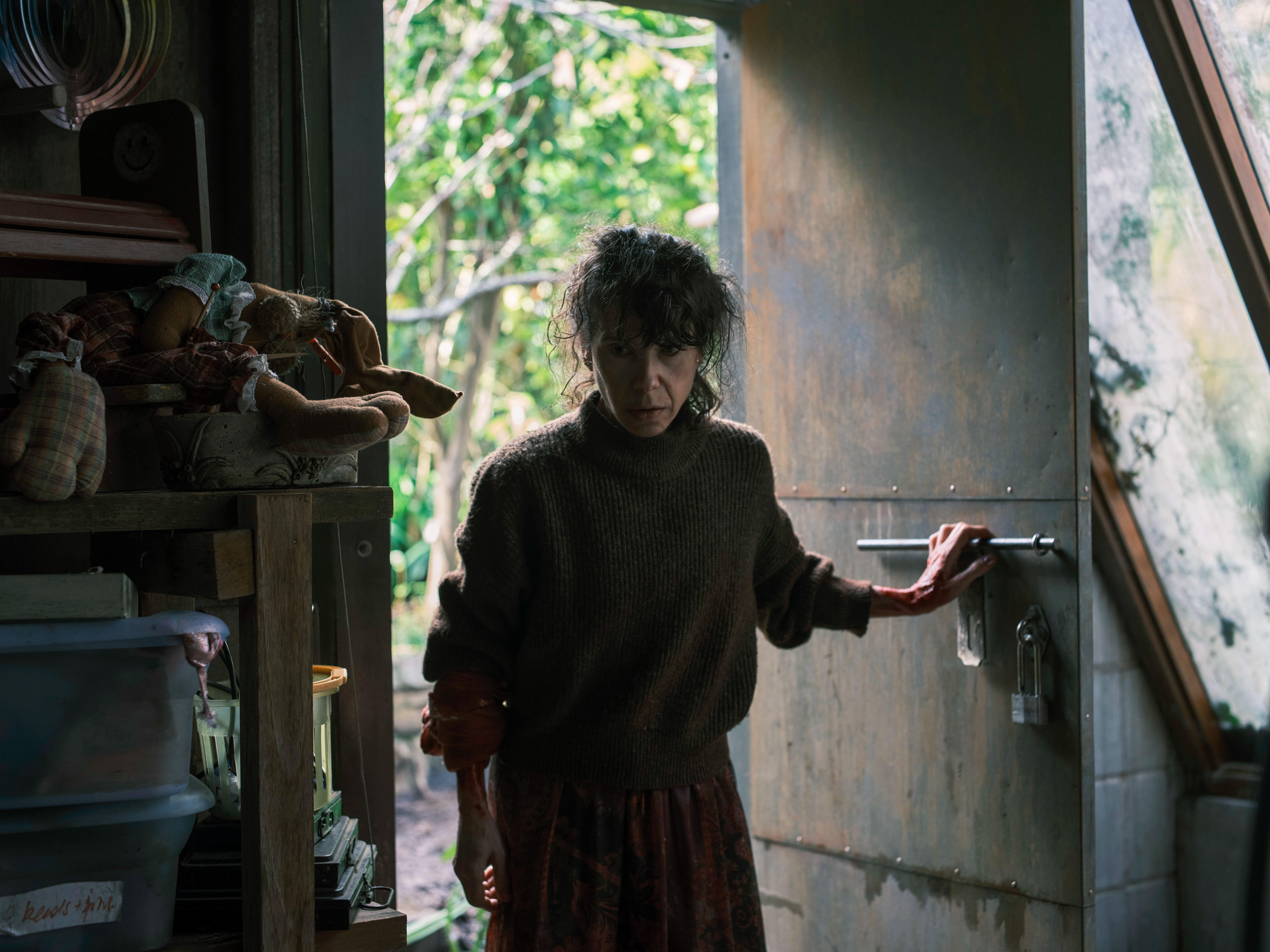
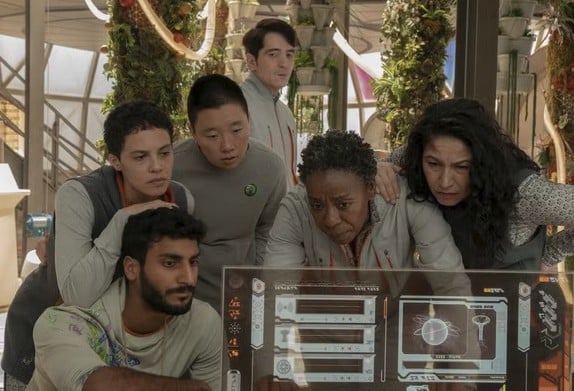

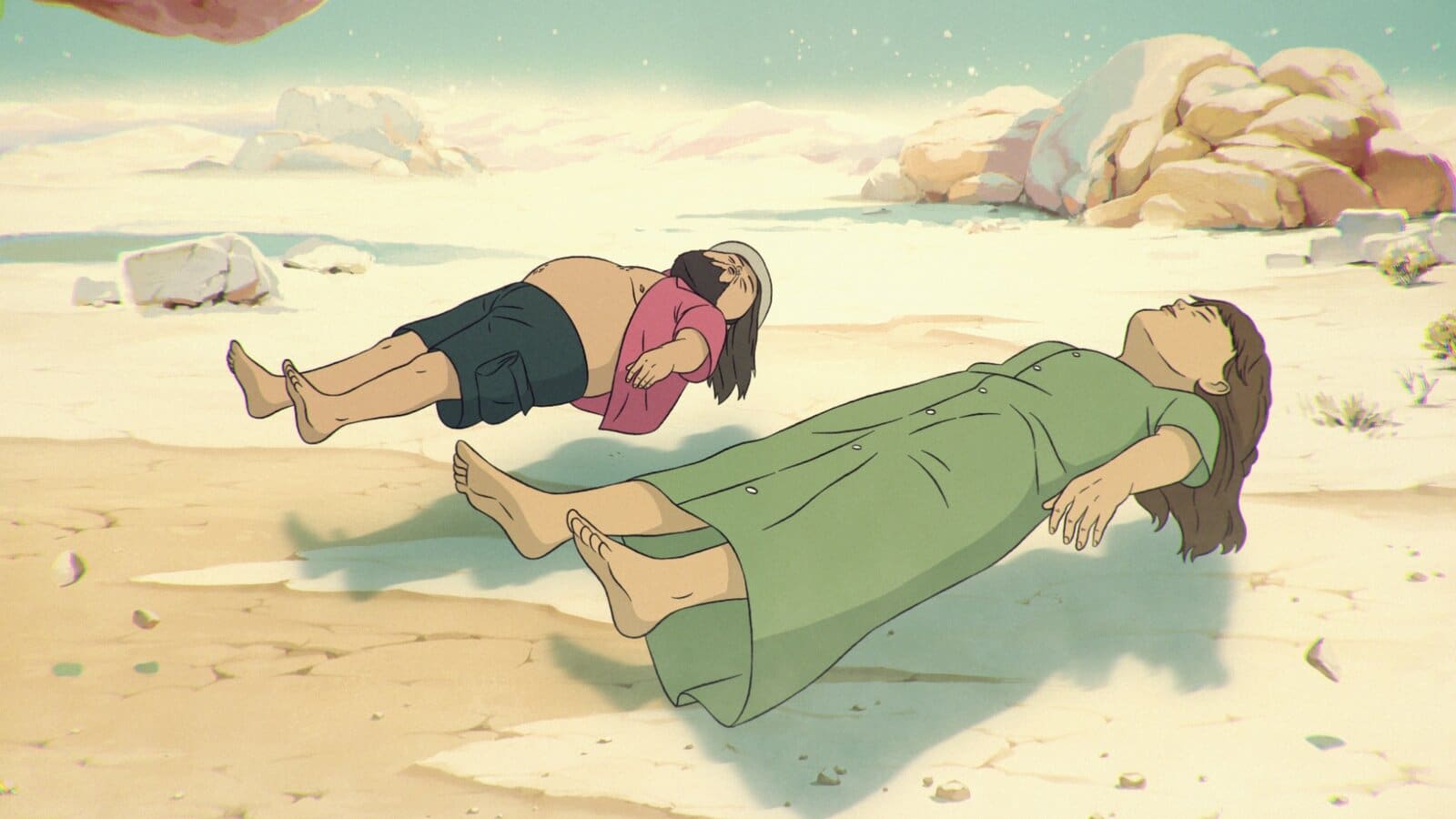


Start a watercooler conversation: